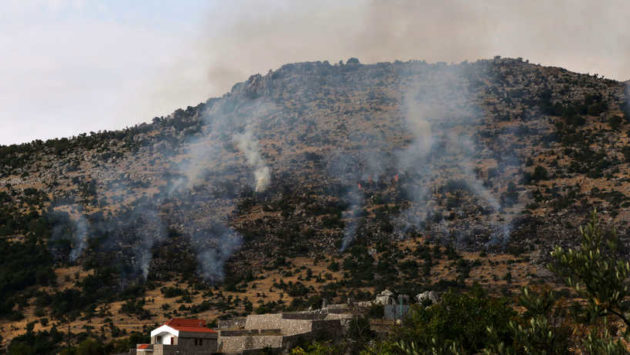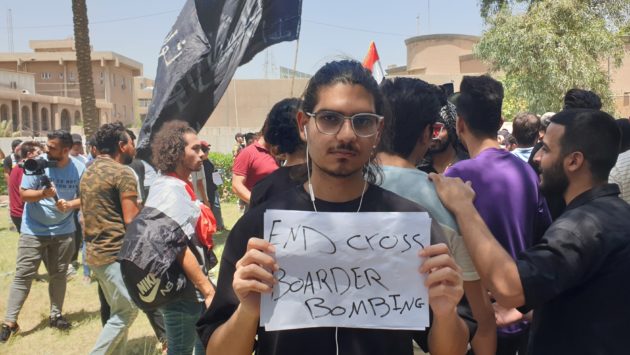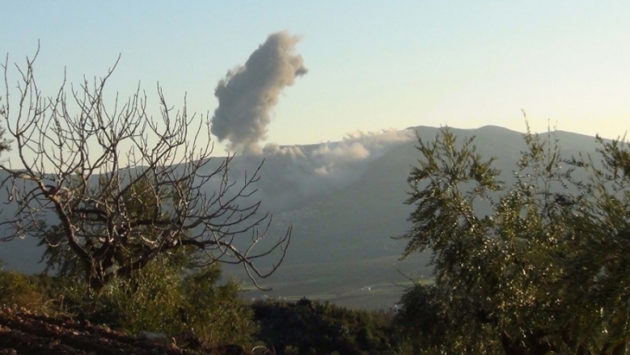Iraqi Kurds Went Anger with Violent Protest Against Turkey
Ahval, 13 February 2019
Arabic | عربي
On January 26, Kurdish locals in northern Iraq’s Dohuk province began to peacefully protest the presence of a Turkish military base in
People from Sirye and the nearby village of Dereluk gathered opposite the base. Gulistan Niheli and Omar Ali Rekani, members of Iraqi parliament for the Kurdistan Democratic Party (KDP), were among those holding a banner that read: “We call upon the Turkish army and PKK militants to respect the sovereignty of the region and take their political and military conflict to their own place”.
The KDP MPs understood the situation well, and had vowed to take local frustrations and regarding Ankara’s bombings to the proper authorities. Yet soon the demonstrators stormed the Turkish base, set Turkish army vehicles ablaze and one young protester was shot dead.
The MPs have yet to make a statement, while the prime minister of the Kurdistan Regional Government (KRG), Nechirvan Barzani, called the incident unfortunate and appeared to take Ankara’s perspective. A separate KRG-statement said there was a “disruptive hand ” behind the events, failing to mention that KDP-representatives were among the protest leaders.
“The official policy of the Kurdistan Regional Government is that our territories must not be used against our neighbors. The cause of these incidents is that groups use KRG land to create trouble for our neighbors and we do not accept that at all,” Barzani said, according to KRG-run Rudaw news.
The “groups” he referred to is the PKK. He was thus essentially defending Turkey’s policy to bomb Kurdish lands and Kurds who are not his allies. What’s remarkable is that the Iraqi government in Baghdad reacted more harshly towards Ankara’s bombings than the local Kurdish government, saying it would summon the Turkish ambassador .
For locals, the issue is not political. For them, the protest was about expressing grief and anger over the 40 friends and family members killed by Turkish strikes in the past thirteen months.
38-year-old Zekiye Mohammed ranted furiously against the bombings and expressed grief for the loss of three of her brothers, one of them her twin, last spring. They had gone to the mountains behind the village to set up an apiary and were found dead a couple days later, next to a bomb crater. She explained how the anger and frustration had built up among locals over the past year.
“The first time civilians die in bombings, you think it is a mistake,” she said. “The second time, you think it is the last time. Then it happens again and you think: surely they won’t do it again. But it happens again, and you think that the authorities will do something about it, but they don’t. And it happens a fifth time, and you think, the president will take action against it, but he doesn’t. So eventually, when it happens again, we have to stand up.”
21-year-old Ayid Ramzi displayed a picture on his phone showing him and other protesters standing on top of a burning armoured vehicle. “The vehicle was covered with plastic because it had been raining. We removed the plastic, set it alight and stuffed it inside the vehicle. We had seen a few jerry cans with fuel standing inside it. It burned well,” he said.

Ramzi said the protesters never intended to turn violent, but that things got out of hand. “We just couldn’t control ourselves any more. And once we lost control, we couldn’t be stopped because we outnumbered the security forces,” he said.
Since the protest, the road to the military base has been blocked by a huge truck. Another road, just out of town, has a new checkpoint. “The PKK is in the mountains behind there, so it’s not safe,” a member of KRG security forces said.
Most locals do not deny the PKK’s right to be in Kurdistan, but they would like to live in peace. Many, like the owner of a small pastry shop, said they had been victims of political dynamics for since the 1980s during the reign of Saddam Hussein, when many villages were emptied.
Today they are losing their lives due to the conflict between Ankara and the PKK, which dates back to 1984. “Remember when Turkey treated wounded ISIS fighters in its hospitals?” asked Zekiye Mohammed. “Did Kurdistan carry out attacks on Turkish soil at the time? No, we did not. You can’t do such a thing. So why is Turkey carrying out attacks on our lands? Why do they kill civilians? I’m sure they can see the difference between a civilian and a PKK fighter.”
Villagers expressed little hope that the bombings would stop any time soon. Still, something has changed in Sirye.
“I have mainly been feeling very sad ever since my brothers died,” said Mohammed, warming herself next to a wood stove in her house on the edge of the village. “I have cried a lot and I didn’t do my work in the house. Now I have also expressed my anger, and that’s been good for me. I feel stronger than before the demonstration.”
By Frederike Geerdink.
Original article here.




